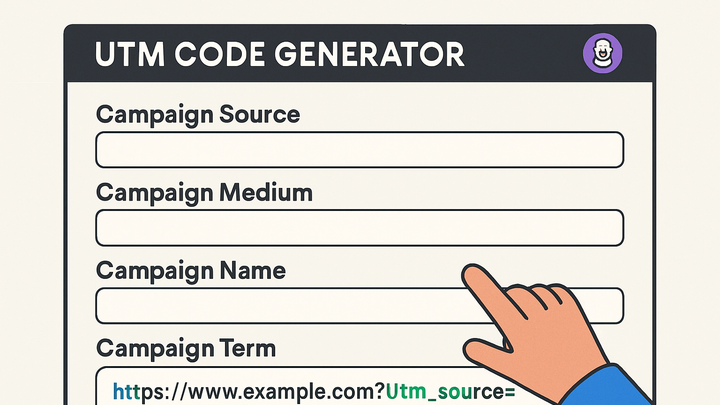Published on 2025-06-29T19:06:54Z
What is a UTM Code Generator? Examples & Use Cases
A UTM Code Generator is an essential tool in campaign tracking & analytics, designed to automate the creation of URLs enriched with UTM parameters (Urchin Tracking Module).
By appending standardized tags for source, medium, campaign, term, and content, it empowers marketers to accurately attribute website visits and conversions to specific marketing efforts.
Instead of manually concatenating query strings and risking typos, a UTM Code Generator provides a guided interface for inputting each parameter, instantly producing error-free tracking URLs.
Advanced generators like PlainSignal integrate this functionality directly within analytics dashboards, while solutions like UTM Guru offer browser extensions and organized URL management.
Whether you’re running email blasts, paid ads, or social campaigns, using a UTM Code Generator ensures consistency, reduces manual errors, and accelerates the process of measuring campaign performance across platforms.
These tools often include features like bulk URL generation and historical records, making them a cornerstone of modern analytics workflows.
Utm code generator
Automates the creation of standardized UTM tracking URLs for consistent, accurate campaign measurement across analytics platforms.
Why Use a UTM Code Generator?
Manually adding UTM parameters to URLs can be error-prone and inconsistent. A UTM Code Generator simplifies the process of creating campaign-specific tracking URLs, ensuring accuracy and saving time.
-
Error reduction
Automatically formats UTM parameters to prevent typos and inconsistencies that can skew analytics data.
-
Consistency across campaigns
Enforces a standardized structure, making it easy to compare performance metrics across multiple channels and campaigns.
-
Time savings
Generates URLs in seconds, freeing marketers from repetitive manual tasks and allowing focus on strategy.
Key Features of UTM Code Generators
When evaluating a UTM Code Generator, look for these essential capabilities that streamline campaign tracking and data management.
-
Customizable utm parameters
Allows you to define campaign source, medium, name, term, and content fields to match your naming conventions.
-
Bulk url generation
Supports generating multiple URLs at once from spreadsheets or lists, improving efficiency for large campaigns.
-
History & management
Keeps a record of generated URLs for future reference, editing, or sharing with team members.
-
Browser extension integration
Provides quick access via a browser plugin to generate or insert UTM parameters directly while browsing.
Example: Generating UTM Codes with PlainSignal
PlainSignal offers a cookie-free, simple analytics platform with a built-in UTM Code Generator. Here’s how to integrate and use it within your HTML.
-
Integration snippet
Insert the following PlainSignal script into your site’s HTML header. It automatically captures UTM parameters from incoming URLs.
- Html code snippet:
<link rel="preconnect" href="//eu.plainsignal.com/" crossorigin /> <script defer data-do="yourwebsitedomain.com" data-id="0GQV1xmtzQQ" data-api="//eu.plainsignal.com" src="//cdn.plainsignal.com/plainsignal-min.js"></script>
- Html code snippet:
-
Accessing utm generator
Navigate to the PlainSignal dashboard > Campaigns > UTM Builder to input parameter values and generate tracking URLs.
-
Viewing results
Track incoming traffic segmented by UTM parameters in the analytics reports, without requiring cookies.
Example: Building and Saving URLs with UTM Guru
UTM Guru (utmguru.com) is a specialized UTM builder and manager. It offers a Chrome extension and a dashboard for creating, saving, and organizing tracking URLs.
-
Generating a utm url
Open the UTM Guru interface, fill in source, medium, campaign, term, and content fields, and click ‘Generate’.
-
Saving and listing urls
Use the save feature to keep a centralized list of tracking URLs for future reuse and auditing.
-
Chrome extension workflow
While browsing, click the UTM Guru extension icon to instantly append UTM parameters to the current URL.
